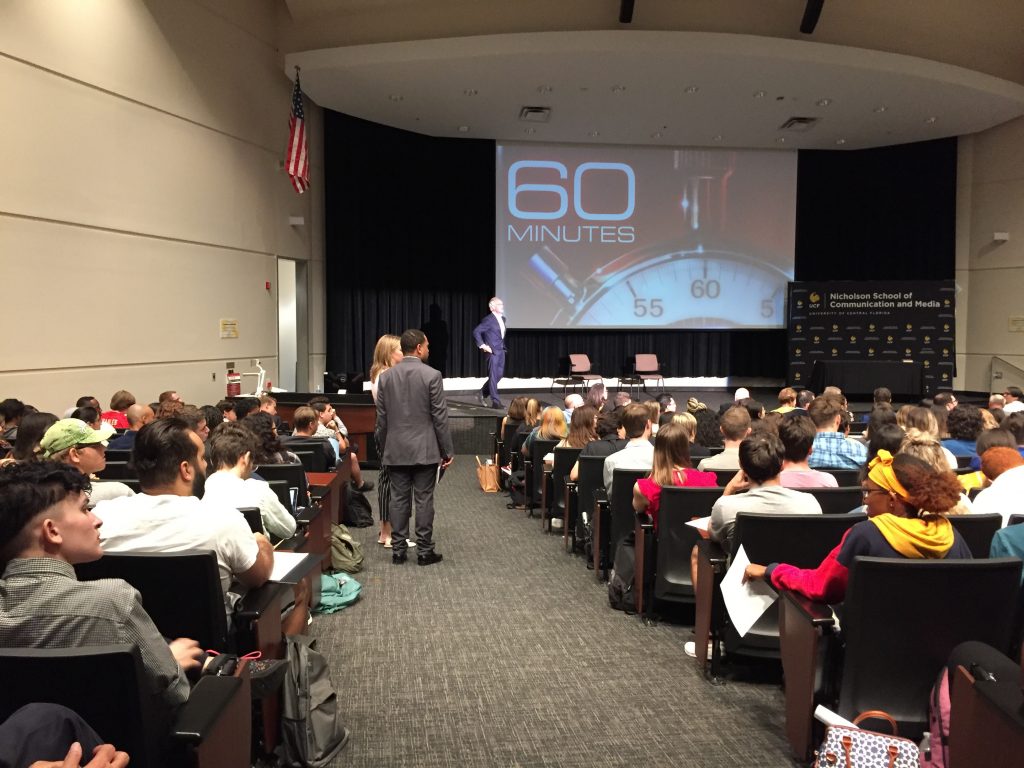
UCF was visited by CBS News “60 Minutes” correspondent Scott Pelley on Monday at the Nicholson School of Communication and Media.
Pelley spoke about the role of a journalist, the fundamental principles of journalism needed to do the job, and role of journalists in preserving democracy and informing the public.
Pelley was invited by Rick Brunson, associate instructor, to speak in his principles of journalism class about Pelley’s experiences as a journalist for over 45 years and his book “Truth Worth Telling.”
Students, alumni and members of the public filled the classroom, which holds over 250 students, and some guests had to stand in the entrance way to listen to Pelley’s talk.

Pelley said the biggest threat to democracy is misinformation, and told students that their future role as journalists is essential to our democracy.
“There is no democracy without journalism,” Pelley said. “The quickest way to destroy a democracy is to poison the information and that is what we are seeing in our lives, in our country today.”
Brunson said Pelley’s book was “so captivating” that he “binge-read” it in three days. Brunson made it required reading for his Principles of Journalism class.
“Everything he was saying is so much and so true of what our profession is about and what we stand for and what we believe in,” Brunson said.
Pelley said there was never a time in history where so much information has been available to the public, but also so much disinformation. He said we need more journalists to help inform the public and protect our democracy.
“We need you, but we need you to follow the values and the principles of journalism that have made American journalism the best in the world,” Pelley said. “No one in this world does journalism as well as we do. People come from all around the world to schools like UCF to learn how to do it right.”
Pelley played a very moving segment of a “60 Minutes” report he did in 2006 during the Iraq War, where he interviewed an Air Force medic about saving the lives of troops.
Attendants reacted with gasps and applause when they found out that the medic he interviewed, retired Air Force Col. Paulette Schank, was in the room with them.
Pelley sat in the room and interviewed her about his “60 Minutes” interview and her experiences afterward. He said he wrote about Schank in his book in a chapter titled “Selflessness.”
Schank said Pelley has the gift of being able to connect with the person he is interviewing, and advised journalism students to try to connect with the people they interview.
“If you can connect with the person you are interviewing you will be able to draw from them what’s truly in their heart and that’s what [Pelley] captured that day,” Schank said.
Pelley said Schank knows how to tell her story, and told journalism students to look for the people who know how to tell their stories.
“Everyone has a story, but in my experience, about 5% of people can tell their story,” Pelley said. “Don’t settle for people who can’t quite tell their story. Look for the natural poets in the world just like Paula Schank.”
Pelley said he recounted in his book the stories of the many interesting people he came across in his career, and that as a journalist he got to meet all sorts of people and go to all sorts of places.
“If the book does nothing else, I hope it inspires a new generation of young Americans to be journalists,” Pelley said. “We need you, but we need you to be good, and that’s why you’re here at UCF learning how to do our work in the best possible way.”



